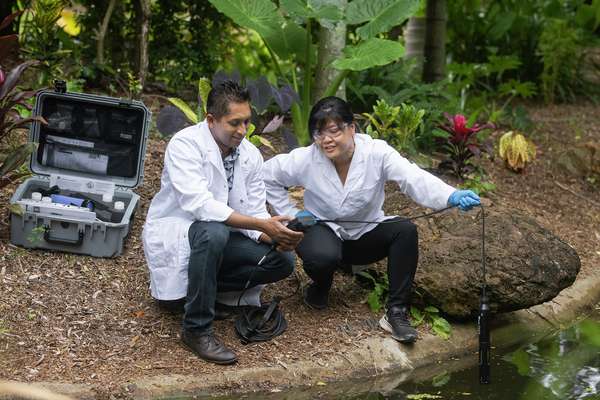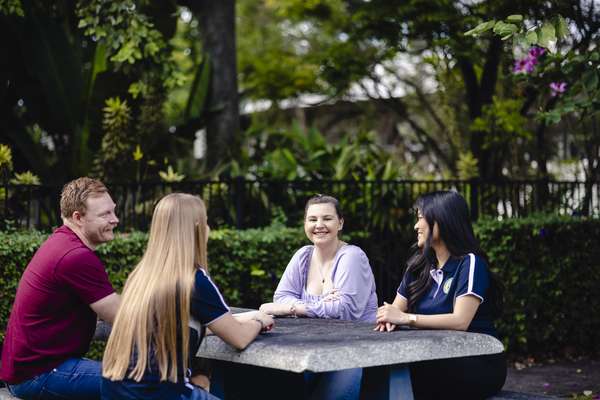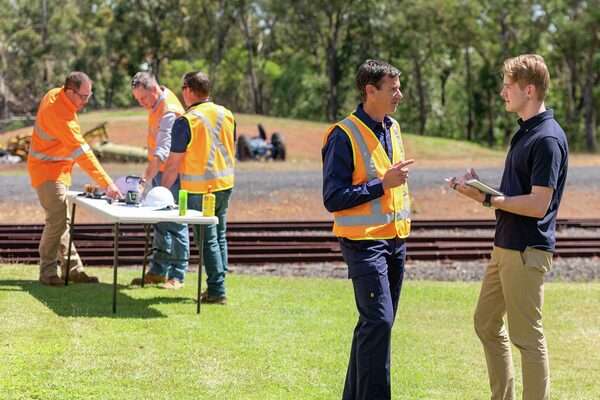Find out more about the THE Impact Rankings
We participate in and coordinate a range of projects, activities, initiatives, and activities that align to SDG 7 Affordable and Clean Energy. Explore the information on this page to find out more.
The Emerald Solar Farm at CQUniversity’s Emerald Campus is a key initiative in the university’s commitment to clean and affordable energy. Completed in 2023, the 200kW ground-based solar array is the largest installed by the university to date. The array is designed to provide the majority of the campus's energy needs while offering hands-on learning opportunities for students. The farm is part of CQUniversity's broader sustainability efforts, aligning with renewable energy goals and supporting Queensland's transition to a sustainable energy future. Read more about this in our latest Sustainability Report.
In addition to the stand-alone solar farm at Emerald, CQUniversity has installed solar panels and inverters on buildings across its regional campuses. This initiative harnesses Queensland's abundant sunlight and the university's large campus footprint to generate solar power. These installations are part of CQUniversity's broader commitment to sustainability, reducing reliance on non-renewable energy sources and lowering its carbon footprint, while supporting the transition to clean energy in regional communities.
CQUniversity has also integrated solar hot water systems across its regional campuses to further enhance energy efficiency and sustainability. These systems leverage Queensland’s sunny climate to provide an eco-friendly and cost-effective solution for heating water, reducing the need for electricity or gas-powered systems. By incorporating solar hot water technology, the university continues to minimize its carbon footprint, demonstrating a comprehensive approach to clean energy and environmental stewardship. This aligns with the institution's long-term sustainability goals and its commitment to reducing operational energy consumption.
CQUniversity has installed Electric Vehicle (EV) charging stations at its Rockhampton campus, available for use by staff, students, and community members. This initiative supports the growing adoption of electric vehicles and aligns with the university’s commitment to sustainability. By providing accessible EV infrastructure, CQUniversity is contributing to reducing carbon emissions and promoting the use of clean energy in the region. The charging stations serve as a valuable resource for the campus community, supporting environmentally friendly transportation options.
In line with the Commonwealth Government’s Net Zero by 2050 targets, CQUniversity is advancing its Decarbonisation Plan (DCP) as a core part of its sustainability framework. Our DCP focuses on reducing scope 1 and 2 emissions by prioritizing energy efficiency and gradually phasing out non-renewable energy sources. Currently, 50% of our energy comes from renewable sources, setting a strong foundation for achieving Net Zero by 2050. The DCP will guide CQUniversity with data-driven decision-making, monitoring, and reporting, ensuring alignment with our sustainability goals across all business areas.
Energy efficiency is a key focus in CQUniversity’s drive towards sustainable operations. To enhance efficiency, we are transitioning to LED lighting across all campuses, significantly reducing energy consumption. New buildings and refurbishments are designed to meet the Green Star 5 standard, ensuring they adhere to high environmental benchmarks. Additionally, smart electricity meters at our Rockhampton and Gladstone campuses allow us to conduct monthly energy audits, identifying trends, pinpointing anomalies, and tracking areas of high energy usage. This data enables us to implement targeted improvements and reinforce our commitment to sustainable energy practices.
Queensland secondary students can now enrol in Fuelling a Hydrogen Future: STEM Skills for Secondary Learning, a free online program offered through a partnership between CQUniversity and the Queensland Government. Developed with Stanwell Corporation and ACCIONA Energía, these micro-credential courses are designed to integrate seamlessly into classrooms, equipping students with industry-relevant skills and preparing them for future careers in the hydrogen and renewable energy sectors. Aligned with the QCAA/ACARA curriculum, students in Years 7-10 and Years 11-12 will explore topics such as hydrogen properties, storage, and safety, while learning how hydrogen can meet global energy demands and support decarbonisation efforts. Upon completion, students receive a digital badge and a Certificate of Completion.
CQUniversity offers a Hydrogen Fundamentals course aimed at providing tradespeople, apprentices, and employees with a comprehensive understanding of hydrogen as a fuel source. This four-hour, non-accredited course covers key topics such as hydrogen production, uses, safety, government policies, and industry trends. Participants will learn about hydrogen chemistry, its historical context, and the current global demand for green energy. The course also explores safety standards, sensor technology, and the use of electrolysers and steam reformers. Upon completion, attendees will receive a statement of attendance. Phone 13 27 86 for more information
CQUniversity's Decarbonisation for SMEs and METS micro-credential introduces participants to key concepts of greenhouse gas emissions and decarbonisation strategies tailored for Small and Medium Enterprises (SMEs) and Mining Equipment, Technology, and Services (METS). Participants will learn about different types of emissions, the impact on climate change, and how to implement decarbonisation strategies within a business. The course includes case studies and practical examples, guiding learners on how to conduct greenhouse gas inventories and set achievable sustainability targets. It also covers how to foster a culture of sustainability and communicate this effectively to stakeholders. Upon completion, participants receive a digital badge and Certificate of Completion. This non-creditable course is accessible to anyone and aligns with the United Nations Sustainable Development Goals.
Some of the recent news stories that align with SDG7 Affordable and Clean Energy:
Our researchers are collaborating with Gladstone Ports Corporation to explore practical solutions for docked cargo ships to shut down their diesel engines and transition to green energy while at port. This initiative aims to reduce emissions and improve environmental sustainability by providing ships with access to clean energy during their stay at local ports, supporting the shift towards greener maritime operations.
CQUniversity Australia and publicly owned energy company Stanwell Corporation, have formed an innovative partnership and commitment to skills development in the renewables space, and is one of the foundation partnerships that will underpin Stanwell’s new Future Energy Innovation and Training Hub (FEITH).
The Hub, located at the Stanwell Power Station near Rockhampton, will support the acceleration of Queensland’s energy transformation to clean energy. As part of the agreement, CQUniversity will collaborate with Stanwell on skills, training and technology initiatives focused on hydrogen, renewable energy and storage technology.
The collaboration will also bring about opportunities for community and school engagement in order to increase interest in renewables and encourage a new generation to consider future careers in renewable energy.
This collaborative project with REA Global evaluated the performance and safety benefits of bi-facial solar panels paired with micro-inverter systems. By capturing sunlight on both sides, bi-facial panels offer enhanced efficiency, while micro-inverters improve safety by reducing high-voltage risks in solar installations. The study focused on optimizing energy output and reliability, aiming to deliver more efficient and safer renewable energy solutions. The findings contribute to advancing clean energy technology and fostering the development of safer, scalable solar power systems.
CQUniversity and Planet Ark Power's joint micro-grid (solar/battery) project is focused on enhancing the accessibility and affordability of renewable energy for businesses and households. By optimizing solar power generation, battery storage, and energy forecasting, the project aims to reduce reliance on fossil fuels, cut greenhouse gas emissions, and lower energy costs. The research also explores how excess solar power can be safely exported to the national grid, further contributing to a sustainable energy future.
CQUniversity has partnered with Sunshine Hydro to develop a Mini Superhybrid™, an advanced software that models renewable energy ecosystems. This project aims to support Central Queensland’s decarbonisation efforts by serving as a global testbed for long-duration energy storage and renewable energy solutions. The partnership will enhance regional skills development in areas like hydrogen production and green fuels, creating new opportunities for the local workforce. The collaboration also includes co-funding research scholarships, positioning Gladstone as a future hub for sustainable energy and green fuel innovation.
CQUniversity researcher Dr. Qing Wu has been awarded a $360,000 Advance Queensland Industry Research Fellowship for a rail decarbonisation project aimed at improving energy efficiency. Partnering with Aurizon, Australia’s largest rail freight operator, and supported by additional funding from CQUniversity, the project will develop a vehicle energy rating system and identify design improvements to reduce energy consumption in Queensland's rail industry. This research aligns with the Queensland Climate Action Plan and Aurizon’s goal of achieving net-zero emissions by 2050, contributing to sustainable rail transport solutions.
Woorabinda, a remote Indigenous community in Central Queensland, has faced challenges with an unreliable electricity supply. To address this, a microgrid system will be developed to provide a stable, renewable energy source for the community. The project aims to enhance energy reliability, reduce dependence on traditional power sources, and promote sustainability. By harnessing solar power and battery storage, the microgrid will deliver a cleaner, more consistent energy supply, empowering Woorabinda with improved energy security and supporting its transition to renewable energy solutions.
Winton is a small township in Central Western QLD with an aging energy supply feeders causing instability in electricity supply. This project, similar to that of Woorabinda, aims to deliver a renewable energy microgrid and local storage of power to gradually reduce the dependency on the aging energy feeders and reduce the impact of outages on the township.
Our partnership project with the QLD Department of Transport and Main Roads and Energy QLD seeks to address the industry-wide problem of enhancing the resilience of electrical distribution networks in the face of high-impact natural disasters. By using renewable energy sources such as solar, we are developing technology to minimise disruption to energy supplies to communities affected by natural disasters. This project aims to influence Queensland government policy to adopt greener energy technology to better support our communities and environment.
Our project, funded by the Kuwait Foundation for the Advancement of Sciences, aims to revolutionize energy efficiency by using solar panels to directly power HVAC systems, bypassing the need for grid connections. This approach significantly reduces energy consumption and greenhouse gas emissions. Additionally, the project is designed to influence government policies in both Australia and Kuwait, advocating for the adoption of greener energy technologies. By demonstrating the feasibility and environmental benefits of solar-powered HVAC systems, this initiative sets a precedent for large-scale implementation of sustainable energy solutions.
We are proud to be Australia’s most engaged university and to support the development of global sustainability.

Access reports detailing our commitment to sustainability and find out what we are doing to address the United Nation’s Sustainable Development Goals.

University policies that govern and guide our commitment

CQUniversity Australia is a trading name of Central Queensland University
ABN: 39 181 103 288
RTO Code: 40939
CRICOS: 00219C
TEQSA: PRV12073